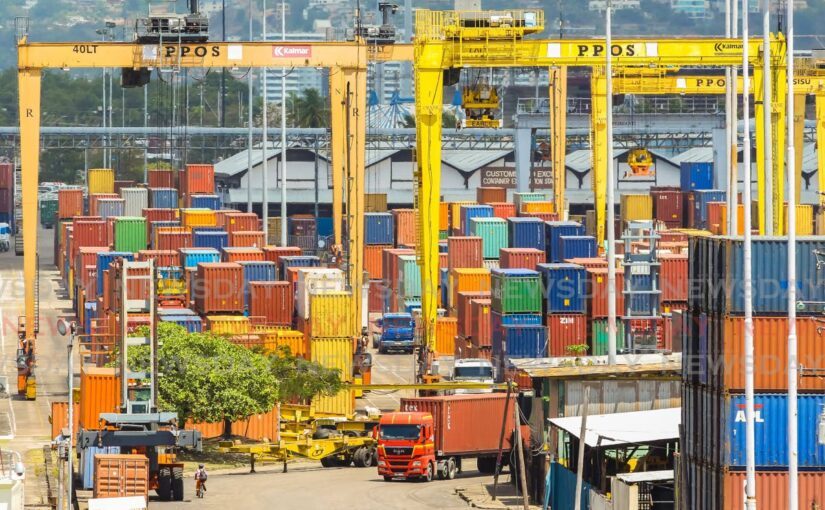The year 2024 was a big year for economic diversification, with the manufacturing sector continuing its upward expansion and engagement through trade...
Vous n'êtes pas connecté
- English
- Français
- عربي
- Español
- Deutsch
- Português
- русский язык
- Català
- Italiano
- Nederlands, Vlaams
- Norsk
- فارسی
- বাংলা
- اردو
- Azərbaycan dili
- Bahasa Indonesia
- Հայերեն
- Ελληνικά
- Bosanski jezik
- українська мова
- Íslenska
- Türkmen, Түркмен
- Türkçe
- Shqip
- Eesti keel
- magyar
- Қазақ тілі
- Kalaallisut ; kalaallit oqaasii
- Lietuvių kalba
- Latviešu valoda
- македонски јазик
- Монгол
- Bahasa Melayu ; بهاس ملايو
- ဗမာစာ
- Slovenščina
- тоҷикӣ ; toğikī ; تاجیکی
- ไทย
- O'zbek ; Ўзбек ; أۇزبېك
- Tiếng Việt
- ភាសាខ្មែរ
- རྫོང་ཁ
- Soomaaliga ; af Soomaali
Rubriques :
 Maroc - NEWSDAY.CO.TT - A la Une - 24/12/2024 08:45
Maroc - NEWSDAY.CO.TT - A la Une - 24/12/2024 08:45
Monetary policy report: Non-energy sector boosts real GDP
The Central Bank of TT’s monetary report for November indicated real GDP improvements in the first quarter of 2024 owing to growth in non-energy sector activity and marginal expansion in the energy sector which has seen a decline in output. The report also noted a decline in core inflation with domestic prices decelerated to 0.2 per cent in October, from 0.7 per cent in June. While inflation is expected to remain contained, domestic and international factors can still affect prices. Conflicts in the Middle East, supply chain disruptions from strikes at US ports, industrial action at local ports and climate events are all factors being monitored by the Central Bank to guide the development and adjustment of monetary policy. High government borrowing and robust credit growth caused a decline in financial system liquidity with excess reserves declining from $4.2 billion in May to $3.4 billion in July. But the shift in global monetary conditions is expected to bode well for Emerging Market and Developing Economies (EMDEs) as currencies strengthen against the US dollar, imported inflation eases and financial conditions improve. EMDEs, including Latin America and the Caribbean, are anticipated to be the engine of global growth, expanding by 4.2 per cent in 2025. The report said, “With the reduction of benchmark interest rates in several major AEs (advanced economies), capital inflows into the EMDEs rebounded and are likely to pickup as global monetary conditions soften.” Globally, economic activity appears to be stabilising despite the lingering effects of past shocks and the emergence of new challenges. Ongoing geopolitical conflicts coupled with trade and competition tensions threaten to deepen geo-economic fragmentation among key economies. And with the possibility of a shift towards restrictive trade policies by the US, the BRICS+ (Brazil, Russia, India, China, and South Africa) trading bloc continues to discuss de-dollarisation efforts and the development of a payments platform among its member countries. These discussions seek to facilitate trade and lending in national currencies, thereby reducing reliance on the US dollar. While global inflation continues to decelerate, the pace is slower than initially anticipated. According to the report inflation continues to remain uncertain around monetary targets in AEs forcing their central banks to remain cautious about initiating monetary policy easing. But in the third quarter of 2024 the Fed (Federal Reserve), the BoE (Bank of England) and the ECB (European Central Bank) lowered their benchmark interest rates citing softer inflation and economic data. The post Monetary policy report: Non-energy sector boosts real GDP appeared first on Trinidad and Tobago Newsday.
Articles similaires
The real struggles of Trinidad and Tobago economy
RUSHTON PARAY THE RECENT IDB report claiming significant productivity growth in TT over the last four years seems disconnected from the harsh...
An Assessment Of China’s Economy In 2025 – Analysis
By Xia Ri There are two prevailing views on China's economy this year: pessimistic and optimistic. Optimists believe that with the government's...
Future Of Jobs Report 2025: 78 Million New Job Opportunities By 2030 But Urgent Upskilling Needed To Prepare Workforces
The Future of Jobs Report 2025, published by the World Economic Forum, reveals that job disruption will equate to 22% of jobs by 2030, with 170...
India's CAD Likely To Exceed 2 Per Cent Of GDP In Q3 FY25 Amid Gold Import Surge: Report
The report highlighted that sluggish FPI inflows in recent months, coupled with a stronger US dollar, are likely to exert pressure on the Indian...
Nigeria and China have Renewed their Bilateral Currency Swap Agreement
The deal renewal will allow Nigerian banks to access yuan through the Central Bank of Nigeria (CBN), enabling businesses to open Letters of Credit in...
Philippines Vows ‘Measured’ Rate Cuts as Price Risks Linger
The Philippine central bank pledged to maintain a “measured approach to monetary policy easing” as upside risks to inflation remain even after...
Charting the future: Vision of a resilient, productive 2025
VASHTI G GUYADEEN As 2025 begins, the TT Chamber reflects on a year of transformative progress and pragmatic optimism. Against a backdrop of global...
Major challenges ahead in new year
THE EDITOR: As we step into 2025, the Joint Council for the Construction Industry (JCC) remains steadfast in its commitment to advancing...
A Comparative Analysis Of Regime Survivability: Iran (2025) Vs. Soviet Union (1991)
The Value of Comparative Analysis Predicting the near future of Iran’s regime in 2025 requires a methodical approach grounded in historical...
Les derniers communiqués
-
Aucun élément




